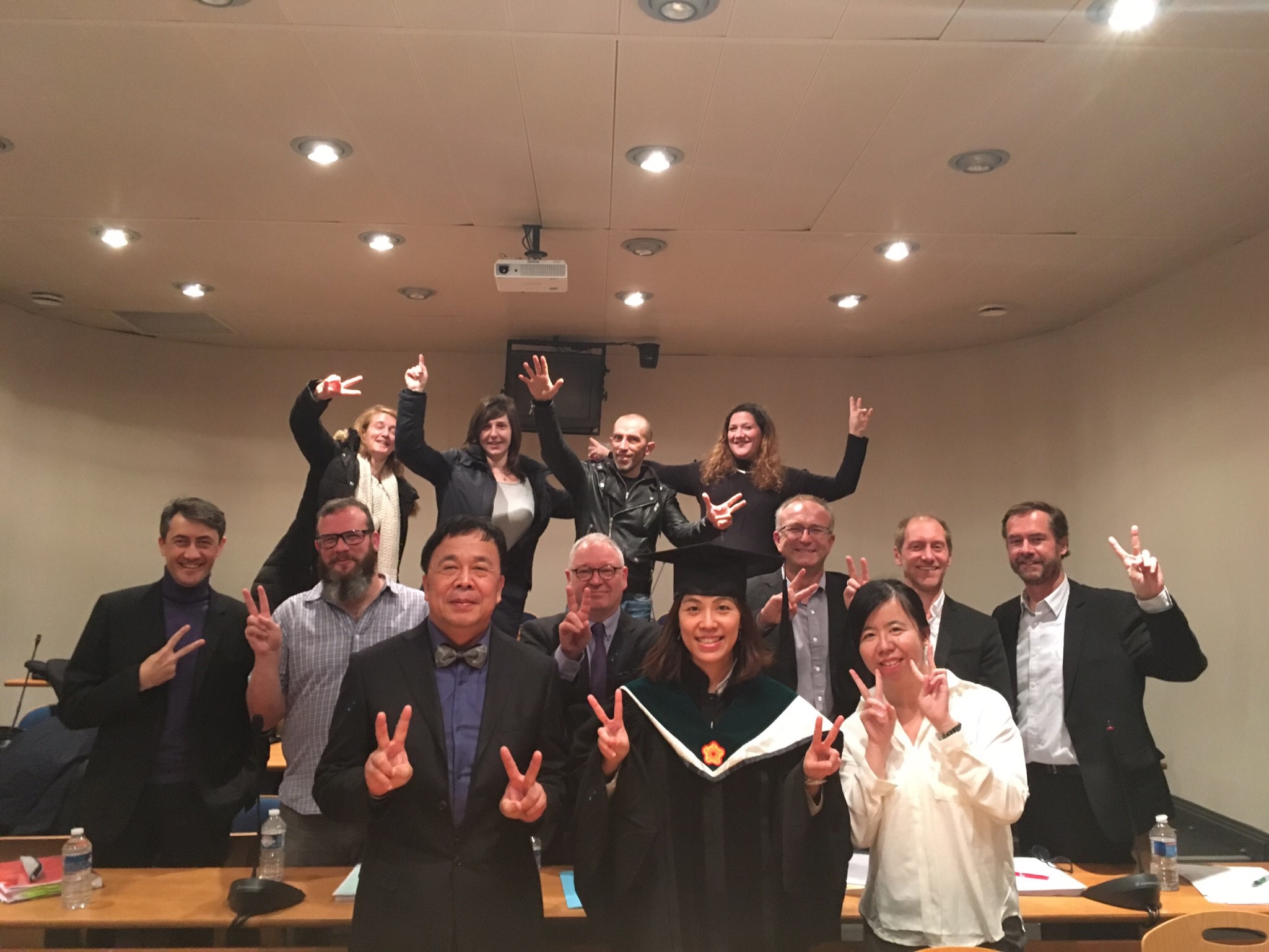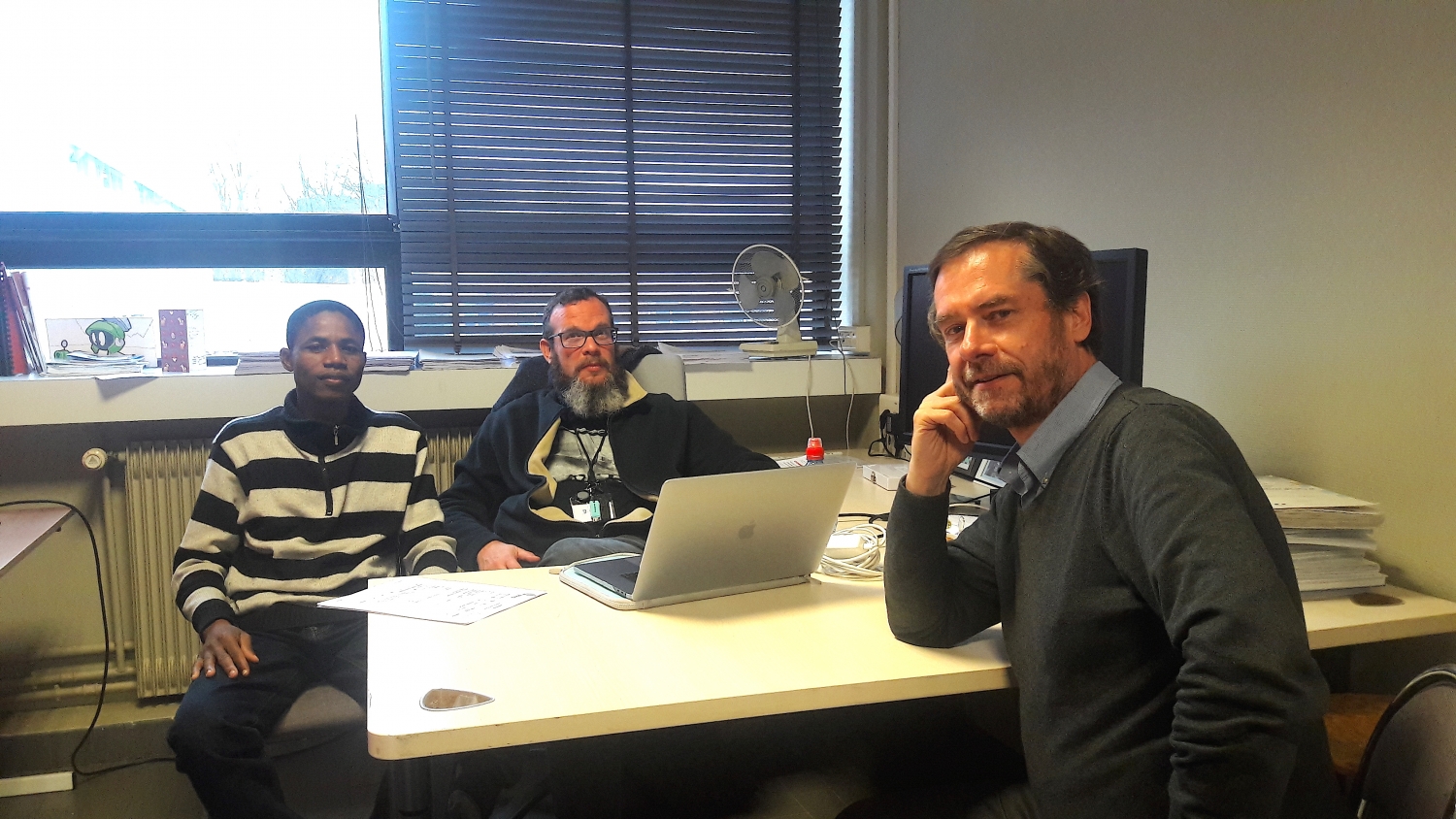The French connection:
TMU dean sends African,
Taiwanese students to learn from Lille labs


Professor Thierry Burnouf is a globally noted blood scientist whose accomplishments include devising a low-cost Ebola treatment regime as well as the first successful treatment of blood products to kill the human immunodeficiency virus (HIV) that causes AIDS.
But even before he landed in the Nobel-winning lab that isolated HIV in the early 1980s, the Frenchman was a foreign student himself, studying grain with the US Department of Agriculture in the US midwest. He says this made a huge difference in his subsequent research and teaching career.
Now Professor Burnouf is helping TMU expand dual-degree programs by sending students to the University of Lille, which is known for advanced studies involving blood products. Recently Spotlight interviewed the professor in Taipei and two of his students, Mr. Ouada Nebie and Dr. Natalie Chou, who now conducts research at INSERM (the French equivalent of the National Institutes of Health) on a scholarship from the French Medical Foundation.
TMU student Ouada Nebie sent his observations from Lille, where he is continuing the research he began in Taipei. Another Lille alumnus, Yao-Ting (Ethan) Hsieh, has graduated and is working in China, having received a Taiwan Ministry of Education award for his dual degree a year ago. TMU student Liling Delila from Indonesia is working with Lille Professor David Devos toward a dual Ph.D. as well.
Joint neuroscience center to debut
These exchanges are being further formalized in November, when a Lille delegation has come to Taipei to discuss a closer neuroscience partnership with TMU. In fact, the parties have already agreed to found a joint neuroscience center, but it has not yet been formally launched.
The real-world benefits of these international collaborations are tangible and noteworthy, beginning with the three joint patent applications from Dr. Chou’s work based on 50/50 ownership between the two universities of potential platelet treatments for neurodegenerative diseases.
Professor Burnouf says promising results using brain-derived neurotrophic factor to treat Parkinson’s and amyotrophic lateral sclerosis (ALS) are shedding new light on autism as well.
Even successful international researchers long for home after years away, and Dr. Chou is already looking past her postdoctoral studies toward her return home to Taiwan, where she wants to continue to do research but also hopes to teach.
On master’s versus doctoral studies
Professor Burnouf strongly urged students to consider combining MS and Ph.D. studies at one institution to increase their chances of success and timely degree completion. He said this continuity is helpful to professors as well, because knowing the student is important in judging what they might gain from onward or outbound study.
These successful Ph.D. exchange students started as master’s students who proved themselves before being selected for the French study year: “We shouldn’t neglect recruiting and supporting master’s degree students … It’s much more challenging to work with fresh Ph.D. students, because they only have three or four years.
“It’s good to start with master’s students because they have two more years to ramp up and show what they are capable of doing,” Professor Burnouf said. “We can help them deliver better work on the same topic, and the professors know them.” This longer-term strategy can deliver a better chance of success in terms of publication, in terms of completing degrees and in terms of less pressure on advisors.
Conversely, Professor Burnouf said that young researchers have brighter futures if they build a specialized research record with useful skills by attaining a doctorate, rather than entering the job track after master’s studies.
Asked what the doctorate gives that the master’s degree cannot, he notes that “It’s difficult to go onward [without a Ph.D.]. Longer-term studies can give the additional time for students to build their personal brands within the very competitive field of research. They may need more things to give value” to their experience beyond the degree.
“Ph.D. students by definition have faced challenges and solved problems on their own. They have skills and flexibility that master’s graduates don’t.”
Standing out from the pack
Professor Burnouf said that it’s not easy to stand out, even with good grades from degree studies. “Students should ask themselves: what’s your value? What skills can you offer? If you don’t have your own expertise, you need to become unique. You can build on the master’s skills and can network more, with conferences, to develop a personal brand with useful strengths.”
Foreign work experience and colleague networks certainly stand out as distinguishing credentials for postdoctoral researchers, he said. Employers too are looking for people who are ready to take risks, and that these students were willing to go abroad and work with people from a different culture is a good indicator.
“We don’t want people who look like they have only a standard experience,” Professor Burnouf said. “With some students, it’s clear from the first day” that they are suited for this kind of challenge.
But it’s not all challenge – a foreign lab may even be a shortcut, so students don’t have to spend years learning to do what another lab is already expert at. “Lille is known to be strong in its work with tau proteins, so instead of Mr. Nebie trying to develop this expertise in the lab here, he can go there,” Professor Burnouf said. “This experience is a tremendous asset, and makes his chances of a strong postdoctoral appointment much better.”
Francophone African finds Lille ideal
Not that Mr. Nebie needed much persuasion – the TMU student was so excited when Professor Burnouf asked him if he’d like to study in France that he shouted “Yes!” twice. He is studying platelets and Alzheimer disease with David Blum, a Lille professor who also spends time on the TMU campus and at Academia Sinica, thanks to support from Taiwan’s Ministry of Science and Technology and the French Office in Taipei.
Professor Blum also works with the College of Medical Sciences and Technology, advising Candy Ting-Yi Renn as well as two prior TMU students. Mr. Nebie has received six months of research stipend funding and his travel expenses from University of Lille, plus a comfortable dorm near the lab with a private bath.
It does help that French is a national language in his native Burkina Faso. The young researcher is eloquent in English as well as he explains his unusual degree progress: “I arrived in Taiwan as a master’s degree student at Taipei Medical University. Over 2 years I have learned a lot from the courses I have taken and from the advice of my mentor, Professor Thierry Burnouf.
“Since my career goal is to be able in the future to work as a researcher at a university or a research center, I decided to do a Ph.D. degree. I personally believe this could open doors to special high-tech research positions. Therefore, after graduating in 2017, I applied for a Ph.D. degree at the Graduate Institute of Biomedical Materials and Tissue Engineering, where I have been selected.”
French year adds value to studies
Mr. Nebie said that the Lille opportunity was a huge incentive to continue with TMU for a second degree: “The director of GIBMTE has shared with us the opportunity to undertake a dual diploma program between Lille University and TMU. He took the examples of Ming-Li (Dr. Natalie Chou) and Ethan Hsieh who successfully obtained their diplomas through this program. I realized that it is another opportunity for me to increase and extend my potentialities.
“Therefore I decided to apply based on the collaboration that exists between Lille University and TMU. My application was sent through Lille University’s online system for preselection. This step was followed by my project’s approval both by Lille University and TMU, and an agreement has been signed. I have been finally admitted to preparing a joint doctoral thesis at the University of Lille and Taipei Medical University.
“I have chosen to study in France because its educational quality is internationally recognized and it offers students opportunities for international exchange. We all remember Louis Pasteur, a well-known French scientist. Pursuing studies there could certainly add value to our experience.”
‘ World-class research laboratory ’
“My research project is related to traumatic brain injury. With the aid of my advisor in TMU, I have since April 2018 joined a world-class research laboratory”: UMR Inserm UMR-S1172 at the Jean-Pierre Aubert Research Centre studying Alzheimer’s disease and taupathies, or diseases involving tau proteins.
“I work with researchers interested in molecular, cellular and physiological aspects of tau biology, neuro-inflammation and related physiopathology. The team belongs to the DISTALZ Excellence Laboratory (Development of Innovative Strategies for a Transdisciplinary approach to ALZheimer’s disease) and to LICEND (Lille Centre of Excellence for Neurodegenerative Disorders).
“In this center, researchers are working with clinicians to facilitate the translation of their findings. It is a great opportunity for me to join this excellent laboratory. Without any doubt, it will bring more value to my career.
“I am therefore encouraging other students to join these kinds of programs. For those who are interested, I would ask them to be curious and less shy.
“The beginning is not always easy. For example, you have to be accepted first by the university, and next be interviewed by Campus France, where you must defend your project and convince them that you will be able to communicate fluently in France, at least in English.
“However, if you are well-prepared, things will certainly go smoothly. There are many things to learn from the others, specifically in Europe. The research field is more advanced in these countries.”
Industry offers alternate research venues
Students seeking international research experience may want to follow Dr. Natalie Chou’s footsteps in another European direction: toward industry. Professor Burnouf arranged for her to gain experience in a German company’s laboratory, and has much to say about the role of business in cutting-edge research:
“Natalie’s German working visa was possible because my lab works with industry. We evaluate the quality of products for various companies from Japan, USA, France or elsewhere. I involve students in these projects so they can understand better” the real-world context of science.
His own path benefited from going back and forth between business and academic life: “I did my [1980s] work with HIV inactivation in cooperation with the Pasteur Institute. This was a mix of academics and business, since the boss was a professor of hematology. Then I was with a medical device company for three years in the 1990s, and I did come to Taiwan to discuss building a possible blood products fractionation plant between 1995 and 2000.
“Blood is interesting; now our lab can follow GMP (Good Manufacturing Practices) and produce blood products for various applications. Our work has been targeted for a product to treat patients … coming from this background, practical results outweigh basic science.”
So Professor Burnouf continues to build bridges between compatible labs to leverage each institution’s specialties in ways that benefit treatment innovations as well as student learning and career prospects. “Devising products requires this knowledge that there’s a prospect of clinical applications. Otherwise the research is just words.”
For interviews or a copy of the paper, contact Office of Global Engagement via global.initiatives@tmu.edu.tw.









